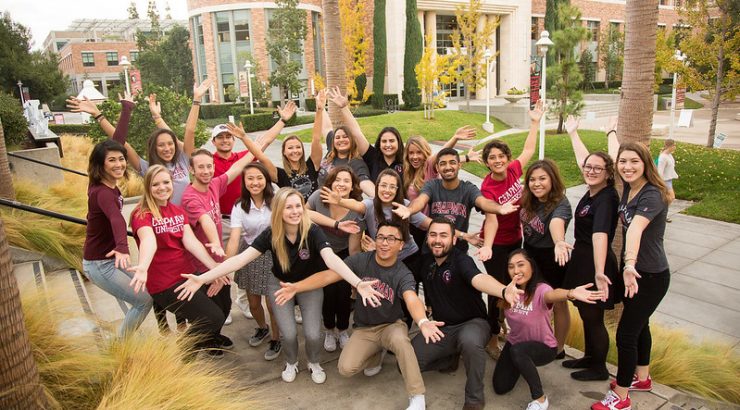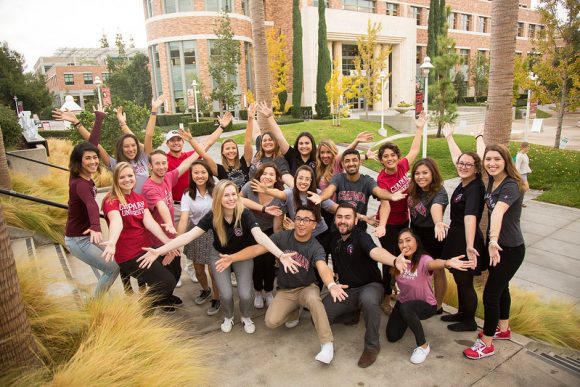
A Chapman “State of Mind” Finding Calm, Comfort, and Connection on Campus
August 25, 2021
In a Chapman “State of Mind”
As we embark upon the start of the academic year at Chapman and resume in-person learning and living, I feel the mix of excitement and apprehension on campus.
As the Director of Wellbeing, I’m committed to advance programs and resources to foster the resilience and long-term wellbeing of our students and campus community.
Whether you’re a new or returning student to Chapman, it’s inevitable that customs and habits that you used to enjoy—or merely took for granted—may challenge you. New norms will become prevalent in how and when we interact with others. We will also face new stressors following the global pandemic as we integrate back into campus and society that may threaten what I call our “re-humanization process”.
I wonder if you’ve experienced or can relate to any of the following issues over the past few months that possibly disrupt your ability to re-humanize.
- A deep longing for belonging and inclusion,
- A feeling of hopelessness and loneliness,
- A need for direction in coping with trauma, grief, injustice, and loss,
- Support to make sense of an overall feeling for lack of meaning, narrative, and purpose.
If so, you’re not alone! Many are navigating and processing an array of crises that have challenged your emotional and mental health. The Chaplains and Directors at the Fish Interfaith Center recognize your concerns. We hear you; we are here for you! We support you during your college experience, as we strive to see you thrive!
Below are some tips and tools to enjoy a healthy and resilient Chapman “state of mind” for you to experience greater calm, comfort, and connection on campus.
Re-train your brain to “re-humanize”
The transition to the “new normal” of campus life is bound to feel different and daunting to your brain. After 18 months of Covid restrictions, physical distancing, endless Zoom meetings, and not engaging in person with friends and fellow students, your “social brain” that instinctively allows you to “humanize” has been stunted. Aspects of campus daily life you took for granted such as hugs, small talk, dating, commute to campus, being back in a classroom, or large group gatherings are literally going to feel foreign to your brain. While this is bound to produce initial anxiety and confusion, learning to re-train your brain to “re-humanize” is essential for flourishing at campus and in life.
Return to Chapman isn’t an “on/off” switch, it’s a dimmer switch
Find your own dimmer switch to help you cope and navigate the return to campus. We despise change and uncertainty, as they drive our anxiety. Your primal brain craves safety, security and stability. It’s why many students are experiencing PISA “Pandemic-Induced Social Anxiety”. Humans are social beings that require connection and community to thrive, yet, the past 18 months of isolation and quarantine have created an imbalance in your Social Brain. Many of us are going to need time to process grief and loss. It’s OK if you feel anxious about being in large groups or social settings. Know how to modulate your own dimmer switch to let your light shine.
Focus on what works for you
Don’t compare yourself to how your friends and fellow students are acclimating to campus. Go at your own pace and don’t fret if you’re simply not going to be able to resume a “normal” return to campus right away. It’s going to be a gradual process that will not be a “one-size-fits-all” solution. Establish a routine or set up a plan to help make the return to campus simple and smooth. Your brain evolved to register negative experiences more strongly than positive ones. Your “risk-tolerance” is going to be different moving forward. It takes practice and discipline to focus on the positive and overcome your brain’s evolutionary drive to be risk-averse in social, school and work environments. Be patient with yourself. Learn to be kind to your mind!
Unity in community
Be mindful how your decisions affect others and the greater community. We’re all in this together. The need for psychological safety is going to be key moving forward, which begins with building trust, respecting others’ needs, and committing to a shared responsibility.
Here are some programs we hope will bring to you more calm, comfort and connection on campus. Discover more on our Chapman Events page.
- “Chapman Calm” Drop-in Hours; M-Th, 10-12, 1-3. Come relax in our tranquil garden space to recharge your body, mind, and spirit.
- “Healthy Brain, Healthy Mind” series. Learn tool for promoting your emotional, mental and spiritual wellbeing. Tue. 12-1 (Staff), Wed. 12-1, Faculty); Thur. 12-1 (Students)
From all of us at the Fish Interfaith Center, we wish you a happy, healthy and hopeful start to the academic year.
Dr. Jay Kumar
Director of Wellbeing, Fish Interfaith Center
Connect with us:
Blog https://blogs.chapman.edu/fish/
Email interfaith@chapman.edu
FB/IG – @Fishinterfaith
Twitter – @CU_Interfaith

